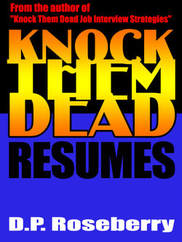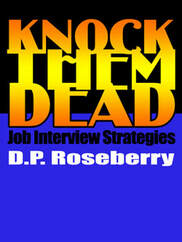Self-Help and Writing
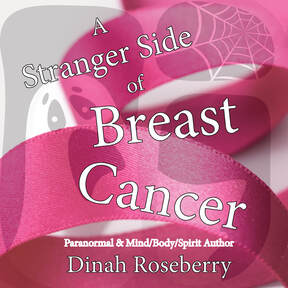
A Stranger Side of Breast Cancer
by Paranormal and Mind/Body/Spirit Author Dinah Roseberry
Dinah Roseberry, author and editor for the prominent company Schiffer Publishing in Pennsylvania, is a strange one. Fighting Stage 4 Breast Cancer since 2012 and still in remission, she’s taken the strange in her life to manage and thrive during a most horrendous journey. Using her paranormal and mind/body/training, she has found some techniques to make things a bit smoother along the way, and now she steps up to the plate to share those methods with you. Filled with tidbits and looking-back lessons, Dinah gives you takeaways to bully breast cancer—to step outside your own body, and strangle this killer of good people. She invites you to: “Come, be strange with me. Let’s try to kick this thing together.”
Available on Kindle, Audible, and I-tunes
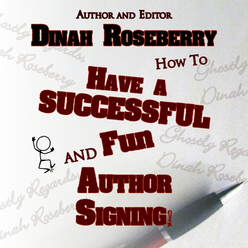
Join author Dinah Roseberry, editor for Schiffer Publishing, as she takes you through her tried-and-true methods for a successful author signing.
Every author dreams of having a extraordinary signing—whether it’s the first time or one-hundredth—but it’s becoming more difficult with the tremendous competition, shrinking venues, and the need for a more high-profile performance.
This short and snappy reference will offer how to’s, guidelines and tricks, and ideas that can help authors to be fabulous publicity engines for their books. Learn where to begin, how to handle helpers, understanding your money options, ways to offer something most people can’t resist, and more. Institute some of Dinah’s quicky tips and follow her easy to understand timeline.
Anyway you look at it, having a successful signing is the first step to your stardom!
Available on Audible and I-Tunes!
Every author dreams of having a extraordinary signing—whether it’s the first time or one-hundredth—but it’s becoming more difficult with the tremendous competition, shrinking venues, and the need for a more high-profile performance.
This short and snappy reference will offer how to’s, guidelines and tricks, and ideas that can help authors to be fabulous publicity engines for their books. Learn where to begin, how to handle helpers, understanding your money options, ways to offer something most people can’t resist, and more. Institute some of Dinah’s quicky tips and follow her easy to understand timeline.
Anyway you look at it, having a successful signing is the first step to your stardom!
Available on Audible and I-Tunes!
The process of finding and getting the right job is old—a concoction of some higher power to make most stable and confident people feel nervous, anxious, overwrought, tense, and generally self-conscious at a very important time when they need all their faculties!
These books will help you to pinpoint your weaknesses and form a plan that will help make you more effective during this critical time.
These books will help you to pinpoint your weaknesses and form a plan that will help make you more effective during this critical time.
What is a resume? Many resume professionals, employers, teachers, and applicants will quickly bombard you with many a bias answer, depending on what each personally wants to believe. Some say a resume is a summary of a person’s background, or experience, or education, or training, or skills, or strengths, or goals, or -- well, you get the general idea. Others talk of advertising oneself, selling a product (YOU!), or merely a necessary evil of the current business world that you just can't get around.
Of course, all these points have merit. But above and beyond all these things that definitely matter, a resume is an aggravation. Not only is it an annoyance to the person writing one for the first time, but it will continue to plague busy minds throughout the working life. The resume is a business-like document that takes the entire professional life (which includes times spent in educational institutions like high school and college or volunteer time) and reduces it to a written page or two. Sad as that may sound, most employers are asking for these painful biographies; and, in fact, they are demanding them.
Why is that? Who would possibly care that much about you and the details of your life? Many say that the employer wants to know a little bit about an applicant’s background and how that person’s qualities will help their particular organization. Others say companies have a right to know about strengths before they talk with a prospective employee face-to-face. These things are also true.
But suppose a company receives two hundred resumes for one position, as is the case in many circumstances for big business these days? Is it conceivable that the interviewer wants to scrutinize two hundred applicants face-to-face before offering that special job? Of course not. So, in some cases, not only does the interviewer want to review qualities and experience, he or she is looking for ways to weed applicants out. Companies want to delve into these personal documents to discover why they do not want to interview you.
Throughout your life you will hear, read, and be taught many different methods of resume writing. Most will swear that their method — voiced, written, or preached — is the only, or the best, possible way to create this mirror image of you. Let me say now that most of the information you gather at these times will be correct and appropriate. However, you must learn to take the bulk of that information and decide, personally, exactly which strategies will make you look your very best.
Always remember that the resume must not reflect the backgrounds and ideas of your parents, friends, acquaintances, rivals, lovers, teachers, counselors, or the mailman delivering it to the employer. It must reflect YOU.
Therefore, I offer techniques and suggestions that will help you write a good resume quickly and with little effort. (Now that’s what you wanted to hear, right?!) Use as many of my tips to keep you from being weeded out as you feel necessary. Combine these ideas with those you like from other sources; or write a resume based solely on the information here. The choices you make should reflect your best effort and introduce you in the best possible light.
Remember, though, no matter how well-worded your resume is, how professional it looks, or how much valuable time you spend on it, you will probably not get a position based on this labor alone. You will still need to show a positive face to the employer with good interviewing skills, enthusiasm, appropriate dress, and excellent communications skills. (All these things can be learned and come with practice.)
But the resume can be a calling card for you, just as the standard business card introduces you to someone. So, don't put it off!
Of course, all these points have merit. But above and beyond all these things that definitely matter, a resume is an aggravation. Not only is it an annoyance to the person writing one for the first time, but it will continue to plague busy minds throughout the working life. The resume is a business-like document that takes the entire professional life (which includes times spent in educational institutions like high school and college or volunteer time) and reduces it to a written page or two. Sad as that may sound, most employers are asking for these painful biographies; and, in fact, they are demanding them.
Why is that? Who would possibly care that much about you and the details of your life? Many say that the employer wants to know a little bit about an applicant’s background and how that person’s qualities will help their particular organization. Others say companies have a right to know about strengths before they talk with a prospective employee face-to-face. These things are also true.
But suppose a company receives two hundred resumes for one position, as is the case in many circumstances for big business these days? Is it conceivable that the interviewer wants to scrutinize two hundred applicants face-to-face before offering that special job? Of course not. So, in some cases, not only does the interviewer want to review qualities and experience, he or she is looking for ways to weed applicants out. Companies want to delve into these personal documents to discover why they do not want to interview you.
Throughout your life you will hear, read, and be taught many different methods of resume writing. Most will swear that their method — voiced, written, or preached — is the only, or the best, possible way to create this mirror image of you. Let me say now that most of the information you gather at these times will be correct and appropriate. However, you must learn to take the bulk of that information and decide, personally, exactly which strategies will make you look your very best.
Always remember that the resume must not reflect the backgrounds and ideas of your parents, friends, acquaintances, rivals, lovers, teachers, counselors, or the mailman delivering it to the employer. It must reflect YOU.
Therefore, I offer techniques and suggestions that will help you write a good resume quickly and with little effort. (Now that’s what you wanted to hear, right?!) Use as many of my tips to keep you from being weeded out as you feel necessary. Combine these ideas with those you like from other sources; or write a resume based solely on the information here. The choices you make should reflect your best effort and introduce you in the best possible light.
Remember, though, no matter how well-worded your resume is, how professional it looks, or how much valuable time you spend on it, you will probably not get a position based on this labor alone. You will still need to show a positive face to the employer with good interviewing skills, enthusiasm, appropriate dress, and excellent communications skills. (All these things can be learned and come with practice.)
But the resume can be a calling card for you, just as the standard business card introduces you to someone. So, don't put it off!
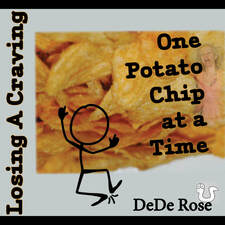
Available
on Kindle, Audible, and I-tunes
Losing weight is never easy for those of us who have tried to take off 5, 10, 15, 20, or more pounds. The hard part is that you start very willing to make the changes needed for a healthy (and less weighted) lifestyle and to rally all the forces in your mind toward taking off those pounds. But, usually, there is a seemingly “tiny” and (cough) harmless culprit that hides in the midst of your woes—in this case, the malicious and delicious potato chip. This little book will help you give up—or at least minimize—that wonderful, delightful-tasting, pound putter-oner. The chip attack comes when you’re hungry and craving. It calls out to you with its sweet-talk voice. Here’s a method using your imagination and visualization to kick one small habit and deaden that voice. Feel afraid to walk down the junk-food isle at the grocery? Let’s not feel that way anymore. I have a way to help you.
